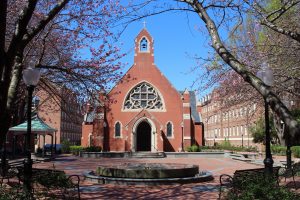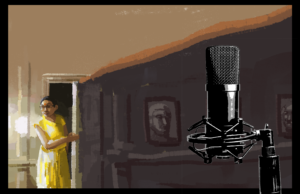Over the summer, Georgetown announced one of its newest additions to the Campus Ministry chaplains, Brahmachari Vrajvihari Sharan. In addition to serving as a Chaplain-in-Residence on the third floor of New South, he will serve as the Director of Hindu Life, the first full-time person to serve in this role and the first Hindu priest serving as a chaplain in the United States. He graciously accepted an offer to chat with the Voice. The following transcript has been edited for brevity and clarity.
The Voice: Can you tell us a little about your academic and religious background? How did you get to be a Hindu priest and chaplain?
Brahmachari Vrajvihari Sharan: Academically speaking, I did my master’s with honors at the University of Edinburgh and my pre-doctoral training at Oxford University’s Oriental Institute and finally my Ph.D. from the University of Edinburgh. And it was in Sanskrit, but that also includes wide area studies – all of South Asia from around 3000 BC to the present as well as all of the intersecting disciplines such as theology and philosophy and socio-anthropology that you might come across.
So that was my academic background, but my kinda religious background, I don’t know if you call it religious as much as spiritual; Hinduism is very, very difficult to define, but after I had finished… my A-Levels I went to India for six months on the invitation of a monk and I thought I would get a bit better acquainted with the religion and a little bit about the rituals maybe even the language, but I ended up staying there six years so the training for a monk usually lasts for 12 years. I was able to complete that in 3 years, and I taught for 3 years before I came back to the UK, and I did a certificate course in Sanskrit at the University of Delhi. I did that also for a year, but it’s very intensive the monastic training and it’s very rigorous as well so yeah I was very lucky to have both sides of the coin.
TV: What attracted you specifically to Georgetown?
BVS: At the University of London, I taught Sanskrit. At Cardiff University, I taught the Dharmic religions and their early history and Sanskrit as well. And what I noticed was, having been in secular universities for a very long time, I came to Georgetown for an interview, and I just noticed that the values that underpin the university and are so proudly displayed everywhere, those sorts of values were, although in the background in secular universities, they were not perhaps given so much importance as you may have found in Georgetown.
The second reason is that it has one of the most developed interfaith ministries I think I’ve ever seen. In Edinburgh, I was involved in the chaplaincy there, and their motto was “for all faiths and none” so they did have the Church of Scotland chaplain, but they also had Protestants, they had Catholics, and they had honorary chaplains. So I was the honorary Hindu chaplain there. Basically, volunteer your service and try and develop the presence, and they were also very keen to develop something there, but Georgetown University was able to develop a very thriving, very dynamic and a very active interfaith model that I think many places want to emulate.
TV: In the August 8th email from the Office of Mission and Ministry, you were described as the “first full-time Director for Hindu Life” at Georgetown and “the first Hindu priest chaplain” in the US. How does knowing that you’re navigating relatively uncharted waters make you feel?
BVS: There are Hindu chaplains in the country. In Harvard, they had the first Director for Hindu Life, but I don’t believe he’s clergy so the distinction that was made was that in Georgetown, they would like to have members of clergy being the chaplains here so that they could provide an extra depth and conversance with the scriptural tradition as well as the ritual tradition and then as well as the interfaith part. So a lot of that was being taken care of by, in other universities, it’s taken care of by either lay Hindus or Hindus that are monks only, and there’s not yet been a trained priest among them so if somebody was born or if somebody died or if somebody wanted to get married, they wouldn’t be able to perform those ceremonies, and those sorts of things I can do as well. But my personal interest is a little more academic and a lot more higher education.
TV: How do you hope to work with the Hindu community at Georgetown?
BVS: I want to be a resource. I don’t want to come in here and create a whole set of new programs because the Hindu students themselves who have led their Hindu Student Association, they’ve advocated for spaces to celebrate festivals, and they’ve made a huge presence for themselves by participating in interfaith and intercultural activities that happen on campus, and so, seeing the dynamism of these students, I would rather just support the activities that they’re doing, but also mindful of what Georgetown would want me to do, just provide the extra spiritual depth to any of the events that they’re doing as well as focus on a few theological programs to try and highlight the similarities or explain some of the differences of Hinduism and the rest of the major world religions here.
TV: Is there anything particularly difficult about being a Hindu chaplain at a Catholic university?
BVS: Nothing and then food…. All of the chaplains have been super welcoming, and the Catholic dimension to the university is a very important one, but I think it’s the Jesuit dimension to the Catholicism at the university that really makes it a place that is less intimidating than if it was just purely a Catholic university. … but I think the Jesuit values have a lot more open-heartedness.
TV: And what do you mean by food?
BVS: I discovered the term “super-vegetarian.” I’ve been described as a super-veg. It basically is the traditional diet that is adhered to by all of the Dharmic traditions in India so whether it’s the Jain religion, the Buddhist religion, or the Hindu religion, all of the serious practitioners would be one-hundred percent vegetarian, they wouldn’t eat onion and garlic as well, and they wouldn’t eat food that was cooked in contact with dishes or utensils that were in contact with meat. [It] proved a little bit problematic, but I found out that a little extra time everyday just to cook my meals and bring them with me …Georgetown tried everything to try and accommodate this, but it’s a very difficult diet. It will get easier with time.
TV: What are you most looking forward to here?
BVS: The opportunity to share in discussions. I think Hinduism has suffered over the years because of the inaccessibility of some of the teachings for people who represented the religion up to now. Thankfully, that is changing. Lots of people who are interested in Hinduism are taking the trouble to learn Sanskrit so yeah, just the opportunity to speak and clarify issues and definitely clarify the stereotypes that are a bit old now…. Just working with, learning from the other chaplains as well and them taking this interfaith and learned approach to religion and passing that onto the students as well. Because I believe even if you don’t believe in religion, a lot of what happens in the world is tied back to religion for some reason or another, and in Georgetown, the students have a unique opportunity to see how religions do get along together, and where it doesn’t get along in the rest of the world, they can then see how they would be able to apply some of the Georgetown ethos to their future roles to encourage the world to become a little bit better.




